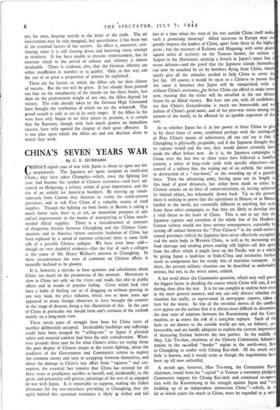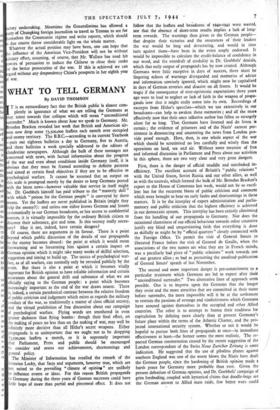CHINA'S SEVEN YEARS WAR
By G. E. HUBBARD
CHINA'S eighth year of war with Japan is about to open not too auspiciously. The Japanese are again rampant in south-east China ; they have taken Changsha—which, since the fighting last year, had become the symbol of Chinese resistance—and have ad- vanced on Hengyang, a railway centre of great importance, and the site of an airfield for American bombers. By moving up simul- taneously from Canton they threaten to isolate the south-eastern provinces, and to rob Free China of a valuable source of food supplies. Though the fighting on both fronts in Burma is taking a much better turn, there is, as yet, no immediate prospect of any radical improvement in the means of transporting to China much- needed Allied supplies. There is a recrudescence of rumours of dangerous friction between Chungking and the- Chinese Com- munists, and in America (where excessive laudation of China has been replaced by a mood of extreme criticism) there is some little talk of a possible Chinese collapse. We have even been told— though on very doubtful evidence—that the fear of such a collapse is the cause of Mr. Henry Wallace's mission to Chungking. In these circumstances the tone of comment on Chinese affairs is naturally inclined to be gloomy.
It is, however, a mistake to base opinions and calculations about China too much on the phenomena of the moment. Movement is slow in China not only on the rivers and roads, but also in public affairs and in trends of popular feeling. Crises which look vital have a habit of fizzling out or of dragging on- without proving in any way fatal, the price inflation, which two or more years ago appeared to many foreign observers to have brought the country to the verge of disaster, being a fair illustration of this. In the case of China in particular one should form one's estimate of the outlook mainly on a long-term view.
These seven years of struggle have been for China years of sacrifice deliberately accepted. Incalculable hardships and sufferings could have been escaped by " selling-out " to Japan if physical safety and material comfort had been the only consideration. What- ever grounds there may be for what China's critics are saying about the poor display of Chinese troops in the recent fighting, about the readiness of the Government and Communist armies to. neglect the common enemy and turn to scrapping between themselves, and about the damage to China's war effort from " squeeze " and cor- ruption, the essential fact remains that China has resisted for all these years at prodigious sacrifice to herself, and, incidentally, to the great, and potentially still greater, advantage of the rest of us engaged in war with Japan. Is it reasonable to suppose, making the fullest allowance for the war-weariness prevailing at Chungking, that the spirit behind this sustained resistance is likely na wither and fail just at a time when the state of the war outside China itself mak such a promising showing? Allied successes in Europe may no greatly impress the leaders of China, apart from those in the higher posts ; but the recovery of Kohima and Magaung, with some 4o, square miles of territory on the Yunnan border, the seizure c Saipan in the Mariannas, opening a breach in Japan's inner line ocean defence—and the proof that the Japanese islands themselve can now be attacked by air by bombers flying from China, should surely give all the stimulus needed to help China to cover th last lap. Of course, it would be op,m to a Chinese to reason tha the surer it becomes that Japan will be vanquished, with or without China's assistance,0e better China can afford to make terms now, trusting that the terms will be annulled in the not distant future by an Allied sictory. But here one can, with all confidence, say that China's Generalissimo is much too honourable and t• jealous of China's good name, and of her post-war status among th nations of the world, to be affected by an ignoble argument of this sort.
As to whether Japan has it in her power to force China to give in by sheer force of arms, combined perhaps with the cutting-off of Free China's means of subsistence, all one can'say is that if Chungking is physically pregnable, and if the Japanese thought that its capture would end the war, they would almost certainly have
made the effort before now. As it is, the Japanese campaigns in China over the last two or three years have followed a familiar pattern, a series of large-scale raids with specific objectives—die control of a railway line, the wiping out of an airfield, the seizure or destruction of a " rice-bowl," or the rounding up of a guerilla force. Then the advancing army, having spun out its length in this land of great distances, has either been made to retire by Chinese attacks on its lines of communications, or, having achieved its limited object, has voluntarily drawn back. Up to the present there is nothing to prove that the operations in Hunan, or in Honan further to the north, are essentially different in anything but scale from these other campaigns, or that they are likely to develop into a vital threat to the heart of China. This is not to say that the Japanese capture and retention of the whole line of the Hankow- Canton railway would not have serious consequences, especially by cutting off contact between the !` Free Chinese" in the south-eastern coastal provinces (which the Japanese have never effectively occupied) and the main body in Western China, as well as by increasing the food .shortage and sending prices soaring still higher—all this apart from the effect which it might have on the Pacific war as a whole by giving Japan a land-line to Indo-China and territories further south to compensate her for steady loss of maritime transport. In short, the present military situation can be described as undeniably serious, but not, in the worst sense, critical.
A last word about the Communist question, which may well prove the biggest factor in deciding the course which China will run, if not during, then after the war. It is far too complex to analyse here even in the most general manner, and one can only discuss whether the situation has really, as represented in newspaper reports, taken a turn for the worse. So few of the essential moves of the conflict ever appear on the surface that it is always most difficult to determine the true state of relations between the Kuomintang and the Com- munists, or to assess the risk of a complete rupture. Such of the facts as are known to the outside world are not, on balance, un- favourable, and are hardly adequate to explain the current impression of increasing friction between the two parties. In the middle of May, Lin Tso-han, chairman of the Chinese Communist Adminis- tration In the , so-called " border " region in the north-west, flew to Chungking to confer with Chiang Kai-shek. Of the result very little is known, and it would seem as though the negotiations have been up till now unfruitful.
A month ago, however, Mao Tse-tung, the Communist Party chairman, issued from his " capital " at Yennan a statement pledging Communist support for Chiang Kai-shek and continued co-opera- tion with the Kuomintang in the struggle against Japan and " the building up of an independent democratic China "—which, in go far as words count for much in China, must be regarded as a sans- ctory undertaking. Meantime the Generalissimo has allowed a arty of Chungking foreign journalists to travel to Yennan to see for temselves the Communist regime and write reports, which should due course throw considerable light on the whole matter.
Whatever the actual position may have been, one can hope that e influence of the American Vice-President will not be without alutary effect, assuming, of course, that Mr. Wallace has used his owers of persuasion to induce the Chinese to close their ranks or the better prosecution of the war. If this is achieved we can egard without any despondency China's prospects in her eighth year t war.



























 Previous page
Previous page